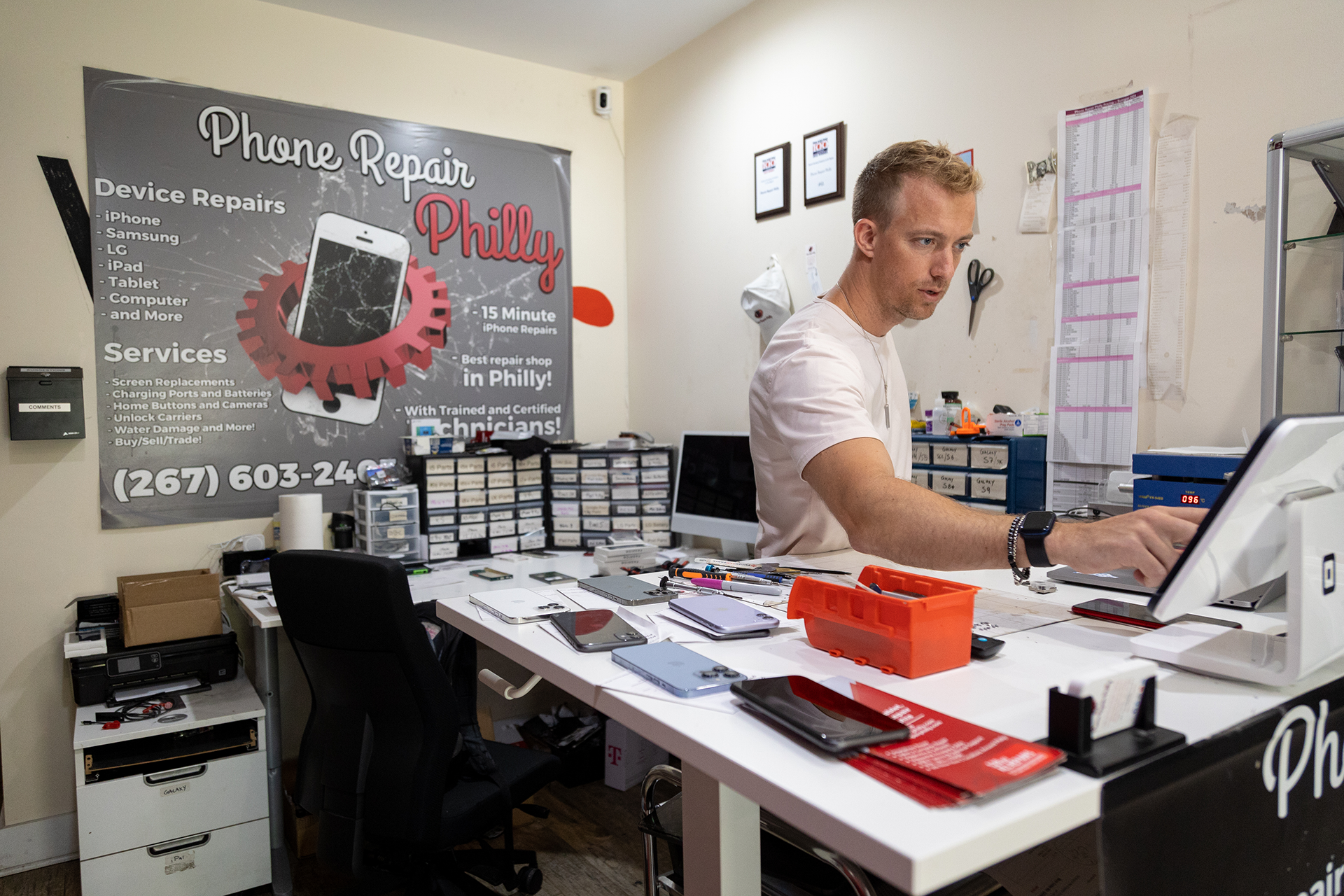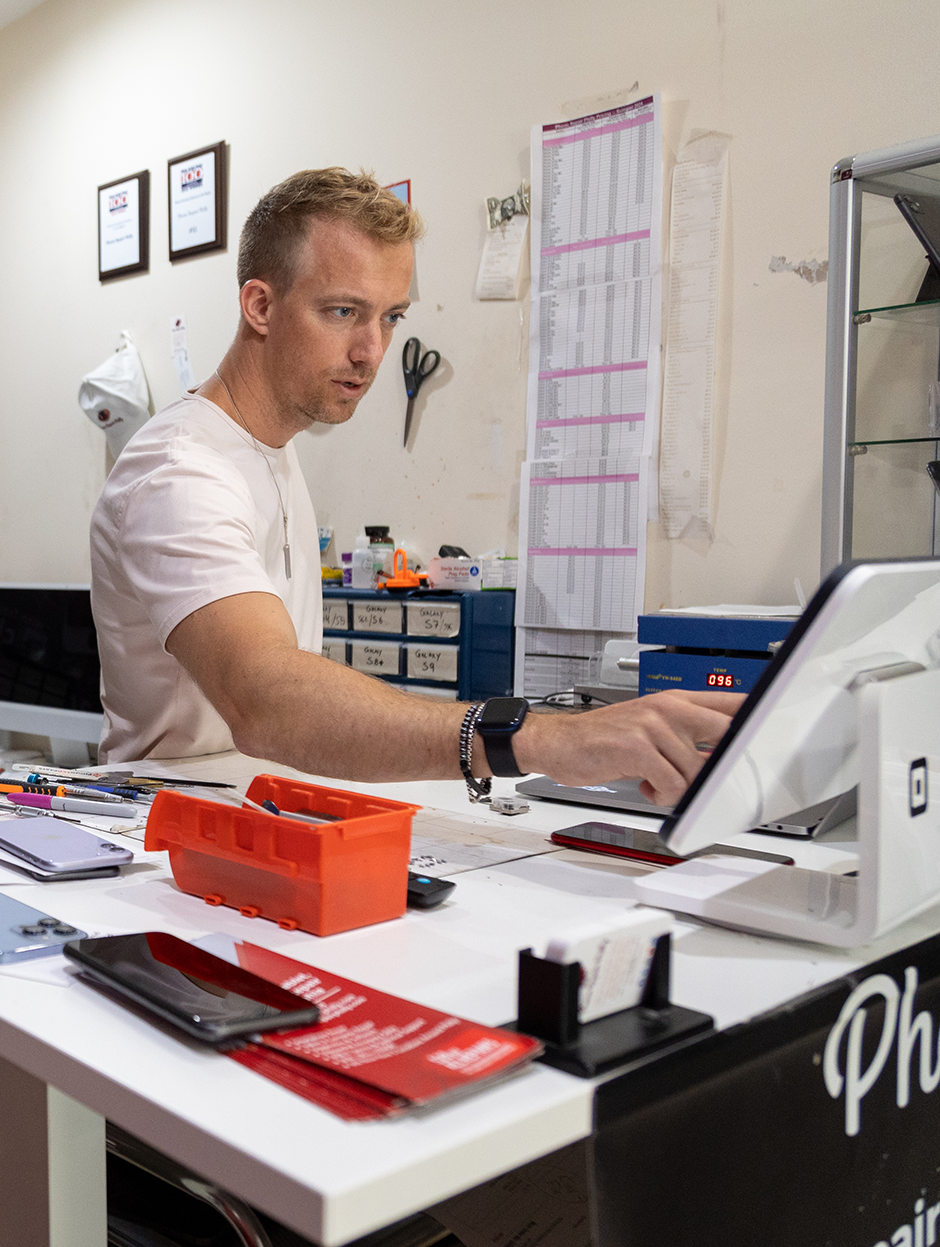When West Philadelphia mechanic Wayne Fleishman has to repair a computer-related issue on a vehicle, he often finds himself reaching out to the manufacturer for more information. After all, newer models have more than a dozen computer systems helping control everything from the tires to the lane departure warning.
Dealerships sell repair information digitally to independent mechanics like Fleishman at a cost ranging from $250 to $2,000 — an expense that’s passed on to the customer. This information is only available to the buyer for a certain amount of time, which is associated with the cost.
That becomes a problem when the information isn’t accurate.
“Sometimes the information isn’t correct, and the dealer doesn’t want to give it to us for free a second time, even though it’s their fault,” says Fleishman, owner of Wayne’s Garage.
Independent mechanics like Fleishman face many barriers to getting the repair information they need, says Lisa Foshee, senior vice president of government affairs and the general counsel for the Auto Care Association, an advocacy organization representing the entire supply chain of the automotive aftermarket.
In some cases, there are special repair manuals that cost more and take longer to get, she says. Other times, manufacturers use firewalls and secure gateways that block independent mechanics from getting any information from the vehicle to diagnose a problem.
That’s why the Auto Care Association has been advocating for state and federal right-to-repair legislation.
“What we are asking is that the aftermarket and the owners of the vehicles be given the same data in the same time frame at the same cost that the dealers get it,” Foshee says.
There’s already such right-to-repair laws on the books in Maine and Massachusetts. At the federal level, the association is supporting the Right to Equitable and Professional Auto Industry Repair (REPAIR) Act, proposed bipartisan legislation that was introduced to the House of Representatives in 2023.
The push for right-to-repair laws first sprang up around the automotive aftermarket more than a decade ago. But efforts have since been waged to pass state and federal legislation requiring manufacturers of all kinds of products to provide the tools, parts and information necessary for repairs.
“Right now, those are things that you cannot get for many, many products,” says Nathan Proctor, senior director of the right-to-repair campaign for PIRG, a federation of state-based Public Interest Research Groups.
There’s proposed right-to-repair legislation across 30 states to change that — including in six states that have already passed laws, according to PIRG’s tracker. These laws cover products such as cell phones, computers, household appliances, copy machines, routers and firewalls.
Mac Frederick, owner of Phone Repair Philly, says right-to-repair legislation would make his work easier. “I think more customers would trust going to a third-party repair shop or a small business and saving time and money,” he says.
Frederick says serialized hardware on iPhones that communicate with the phone’s software can make it difficult for third-party repair shops like his to fix the phones with parts from resellers. Sometimes customers get a notice in the settings about the mismatch and other times the parts won’t work at all.
“It just causes confusion and an inconvenience for the consumer,” he says.

Apple and other large companies have historically been against right-to-repair laws, but in 2022, Apple supported right-to-repair legislation in California, according to reporting by CNBC. And in 2023, Apple supported the idea of nationwide legislation, so long as it provides uniform regulations for data security and product integrity, according to the same report.
Proctor says companies have an incentive to compete to make more money, and legal protections are essential to create an even playing field, especially with the speed with which digital technology changes.
Legislators and advocates agree right-to-repair legislation, once passed, would ultimately make the economy more fair for consumers. It would also benefit the environment, they say.
Foshee says there’s an environmental argument to be made for automotive right-to-repair laws: Like other consumer products, it’s better to repair cars than put them in landfills. And the longer owners can keep their cars on the road, the less waste there will be.
Proctor highlights the energy-intensive manufacturing process for smartphones: The amount of energy it takes to charge a smartphone is only a tiny fraction of how much energy it took to produce it, he says. “For every cell phone that we produce, we have to mine and smelt and manufacture and ship these products.”
If Americans kept their cell phones one year longer on average, the emissions reduction would be the same as taking 636,000 cars off the road, Proctor says, citing PIRG’s 2020 report “The Fix Is In.”
It doesn’t help that, once electronics have reached their natural end, the majority of e-waste isn’t recycled. In 2022, the world generated 62 million metric tons of e-waste, according to the most recent United Nations report. Only 22.3% of that waste was recycled properly.
This will undoubtedly extend the useful life of our devices, sending fewer of them to the landfills and putting less demand on the raw products needed to produce them in the first place.”
— Kyle Mullins, State Representative, Lackawanna County
“This will undoubtedly extend the useful life of our devices, sending fewer of them to the landfills and putting less demand on the raw products needed to produce them in the first place,” says State Rep. Kyle Mullins, D-Lackawanna County, who plans to introduce a right-to-repair bill in September.
Mullins says that for now his bill will exclude coverage for farming and medical equipment to protect consumer safety, a decision informed by a March 2024 hearing in the State House Commerce Committee. “There’s certainly some products out there, some equipment that would not be appropriate for you to repair or tweak yourself, or go to some technician not fully trained or perhaps cleared to work on that very device,” he says.
Proctor, on the other hand, doesn’t believe any products should be excluded from right-to-repair legislation; exemptions, he says, are the result of successful lobbying. “The companies that make those products fight really hard,” he says.
There may be specialized products that require separate policy solutions, Proctor adds, but “at the end of the day, monopolized repair is bad.”
Mullins’ bill won’t be the first right-to-repair proposal in the state legislature. In 2023, State Sen. Mike Regan, R-Cumberland/York, introduced S.B. 744, a right-to-repair bill that would provide coverage for digital electronic equipment. If passed, the bill would require manufacturers to provide product owners and independent repair providers with “documentation, parts and tools used to diagnose, maintain and repair digital electronic equipment.” The bill excludes cars, medical devices and outdoor power, farming, yard and construction equipment.
“It comes down to protecting consumers from restrictions imposed by manufacturers of electronics — products that are an everyday need in our lives. Not to mention, having the right to repair extends the life of these products and reduces the amount of e-waste,” Regan says in a statement.
“For me, the right to repair means having actual ownership of these devices.”
With Mullins’ forthcoming bill, Regan says he’s hopeful the House and Senate will be able to accomplish final passage of right-to-repair legislation by the end of this year’s session.
Proctor says right-to-repair legislation is a prime opportunity for bipartisanship, and Pennsylvania would be the perfect place to display that with its divided legislature.
“We think everybody needs to fix their stuff,” Proctor says. “It’s really about product owners against product manufacturers, not any other kind of political fight.”








